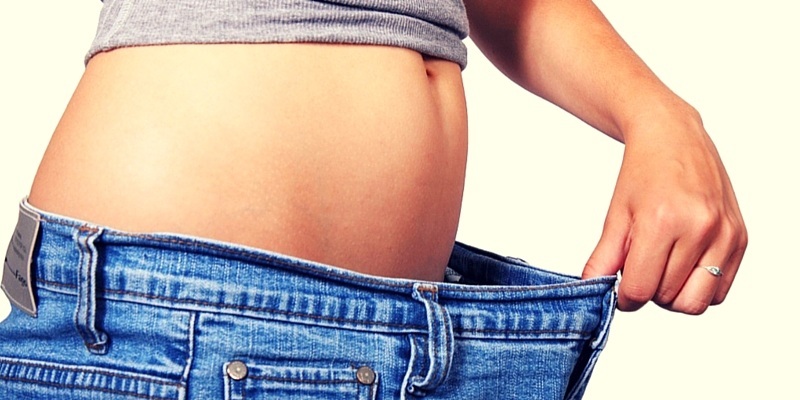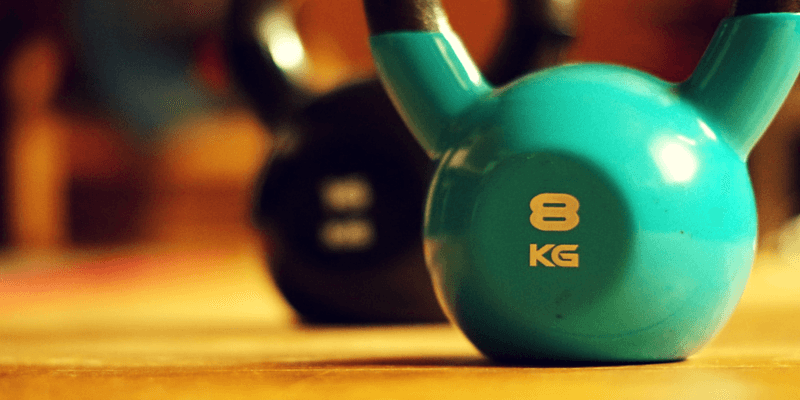Have you ever lost 10-15 pounds and gained it all back in a matter of weeks?
This is a common problem faced by nearly everyone attempting to lose a substantial amount of weight. Most people trying to lose those extra inches around their waist are familiar with the “yo-yo effect” — bouncing up and down in weight, struggling to keep the weight off permanently.
So what gives? Is your life playing a cruel joke? Is your natural weight simply higher than you’d like it to be? Do you just not have the genetics to stay at a lower weight?
It’s likely none of those things. (Well unless you did some really messed up thing in a past life and are paying the karmic consequences in this one but…. yeah it’s likely none of those things).
The reason you’re struggling to keep the weight off all lies in how you lost it in the first place. We’re willing to bet you didn’t lose weight the “right” way. Yes there is a right way to lose weight or rather a better, more sustainable way than the way most people try to go about doing it.
Most people try to take shortcuts. They think the quickest way is the best or easiest way.
If you want to know the quickest way to lose 30 pounds cut off an arm or leg. Seriously, (please don’t do that). This is just an example to show you that the quickest way doesn’t necessarily mean the best way.
You want to lose the weight and keep it off right? You don’t want to have to continuously lose 15 pounds every 3-4 months do you? That’s the hard way of doing things.
We’re going to show you what the real, easy way to lose weight is.
The Calorie Game
If you haven’t already we strongly encourage you to read this guide to get caught up on the basics of a healthy diet. We cover everything you need to know about calories, macronutrients, and the types of foods you should be eating.
In that guide we mention how weight loss is simply a game of calories in and calories out. As long as you burn more calories than you take in you’ll lose weight. Obvious right? But people aren’t playing this “game” the correct way and it’s where they make their biggest weight loss mistake:
Refusing to eat food!
Do you know what happens to your body when you consume under 1000 calories a day for multiple days in a row? It goes into what people like to call “starvation mode”.
Starving is a bad way to lose weight. In fact, it’s probably the worst way to lose weight (besides cutting off a limb).
First of all, your body’s metabolism comes to a screeching halt. It’ll burn as few calories as it possibly can since you’re not giving it the energy it needs to function properly. If you’ve ever tried this before you know it feels absolutely terrible. To make matters worse, once you do start eating regularly again, your weight will shoot back up immediately. Your body likes to keep itself in homeostasis so it’ll fight back against any drastic calorie restrictions and you won’t be able to sustain it.
Yes there is debate whether “starvation mode” is even real thing. But the real problem with starving yourself is it’s not sustainable. Instead of implementing real changes to your eating habits you’re hoping you can cheat by doing a crash diet. Remember that’s the hard way of doing things. In the long-run, if you change your eating habits maintaining a healthy weight becomes much easier!
This is a good opportunity to clarify what your real goal is. It isn’t weight loss. It’s fat loss. That’s an important distinction to make. You want your body to be lean and tight, not a blob of leftover fat even if it means you’ll weigh less pounds overall.
So How Much Are You Really Supposed To Eat?
Only slightly below maintenance. About 500 calories below to be exact. We talk more in depth about this in the guide we linked to above but basically, to find out the number of calories you should be eating to lose weight, use this equation:
12 x (your current bodyweight in pounds) = the # of calories you should be eating per day to lose weight.
This is assuming you won’t be working out and will strictly be losing weight by dieting otherwise you’ll have to increase the calorie count slightly.
Remember that 3500 calories = 1 pound. After about a week you will have lost 1 pound. If you have a lot of weight to lose it’s actually possible to lose about 2 pounds a week or even more in the beginning but most of it will be water weight which might make you look less bloated but doesn’t really count.
What about the types of foods you should be eating? We covered those back in this guide along with specific food recommendations (seriously you should go read that). Basically a high protein, low carb diet. From our experience, it’s a diet that works for the majority of people. The reason you keep your protein intake high (about 1 g per pound of bodyweight) is because protein keeps you lean and keeps you full better than both carbs and fats so you’ll be less likely to overeat.
Carbs like breads, pastas, ice creams, sodas, and even fruits high in sugar are kept low because they’re the high calorie foods that are most responsible for people bulking up with unnecessary weight in the first place.
If you want to see results even faster you can even try completely eliminating all grains from your diet. After your weight stabilizes, reintroduce them again if you like but in limited amounts. This might be the single most important change you can make to your diet for weight loss. Heck we bet if you just completely eliminated all grains and kept the rest of your carb intake low you’ll lose weight without even having to pay attention to calories or the food you eat. It’s seriously that easy. At the very least transfer over to a whole grain only diet and make white breads a thing of the past.
We also highly recommend eating plenty of seafood and getting your recommended daily allowance of Vitamin D. Seafood is high in Omega 3 fatty acids which is one of the most beneficial, well researched and scientifically-backed nutrients around. Increasing your Omega 3s intake helps burn fat effortlessly.
Vitamin D also helps keep you slim by promoting fat loss so make sure you’re getting enough of it. Most people living in the northern hemisphere are deficient and while it’s best to get Vitamin D through your diet and sunlight, if you can’t because you’re stuck in an office all day, supplement because it really is that important.
The Most Effective Weight Loss Method (That Actually Works)
So remember earlier when we said starvation mode is bad? It is bad. Very bad (if it really does exist). But temporary starvation is a good thing.
What’s temporary starvation? It’s basically fasting. Fasting is the most underrated method of losing fat quickly. But we’re not talking about any extreme week long fasts here. We’re talking about something called “intermittent fasting” (IF) which basically condenses your eating time into an 6-8 hour window (approximately).
So if you were to use IF, assuming your last meal was at 9 pm, your next would be at 1 pm the following day. Then you’d eat all the food for that day in the 8 hour period between 1 and 9 pm. You’re not actually eating any less food during the day. It’s the same number of calories just condensed into a smaller window.
Here’s just some of the research-backed benefits of IF:
Delays aging and reduces the chances of developing Type II Diabetes, Alzheimer’s, and Parkinson’s.
Increases growth hormone secretion making gaining muscle easier.
Shows promising results to reducing the side effects of chemotherapy.
The hardest part is simply getting used to going without any food for 16-18 hours straight. There is an adjustment period which seems to last a couple weeks where you’ll feel very hungry during the off hours.
The good news is that if you’d like, you’re able to eat more during your eating window. Yes instead of eating at a caloric deficit you can eat at your maintenance level and still be able to lose weight especially if combined with exercise.
But if you’re fasting it becomes even more important to eat a high protein diet (at the very least 1 g of protein per pound of bodyweight) to help preserve muscle mass and we still recommend keeping carbs relatively low if you’re not planning on working out that day. You will have more leeway than usual here with your carbs so if you really can’t cut back on them enough intermittent fasting would be worth looking into.
Once you’ve reached your goal weight, you can either keep up the daily fasting if you really like it or you can do it occasionally just to keep your body in check.
What About Cheat Days?
Indulging in a guilty pleasure every once in a while is fine BUT…. when starting to make real changes to your eating habits we recommend not taking any cheat days until you’re at least a month with your diet.
Yes they might keep you sane and motivate you to keep going but it’s important to let your body become accustomed to eating healthier foods and not the usual bad stuff. Sugar addiction is real and we don’t think tempting yourself with a chocolate bar one week into a diet is a good idea. It’ll increase your appetite and you’ll be more likely to fall off track.
There’s also a tendency to go overboard with cheat days and eliminate any progress you made earlier in the week. This is especially likely if you’re an impulse eater or overeat for emotional reasons. Reward yourself with a cheat day AFTER sticking to your 500 calories under maintenance or intermittent fasting routine for a month. That’s a real reward for making it that far.

The goal is to implement permanent habits rather than a temporary change. To adjust your body to a new “normal”. You want eating healthy to feel natural to you and not like a chore.
Eventually, you’ll want to reach the point where cheat days aren’t even necessary anymore. Where the thought of eating something unhealthy makes you feel worse than the pleasure you’d get from actually having eaten it. Because you’ll know that you’re getting further from your goals rather than closer.
The best way to do that is by staying consistent in the beginning and not giving in to your urges to eat foods you know you shouldn’t be eating. Habits need time to become second nature and you have to stay consistent for them to form properly.
Others might disagree and if you do let us know in the comments. There’s more than one way of sustaining weight loss but in our opinion avoiding cheat days until you become more accustomed to eating healthier foods is the best way.
Recap
- Don’t starve yourself. Eat food just eat the right kind and the right amount.
- Eat at 500 calories below maintenance. Remember the equation 12 x (your current bodyweight in pounds) = the # of calories you should be eating per day (Approximately)
- A high protein, low carb diet might be cliché but it works and is the best way to go about losing weight for the majority of people.
- Avoid ALL types of grains. If you must, stick to whole grain only.
- Schedule your meals into an 8 hour period and fast the other 16. This will help you lose weight quicker and offers a variety of added health benefits.
- Make real changes to your diet. If you really want the weight to stay off you have to get used to eating healthy foods and begin liking them if you don’t already do. This is why you should avoid cheat days during the first month.
Remember: PERMANENT HABITS not TEMPORARY CHANGE. Change your eating habits for good and your results will last.






